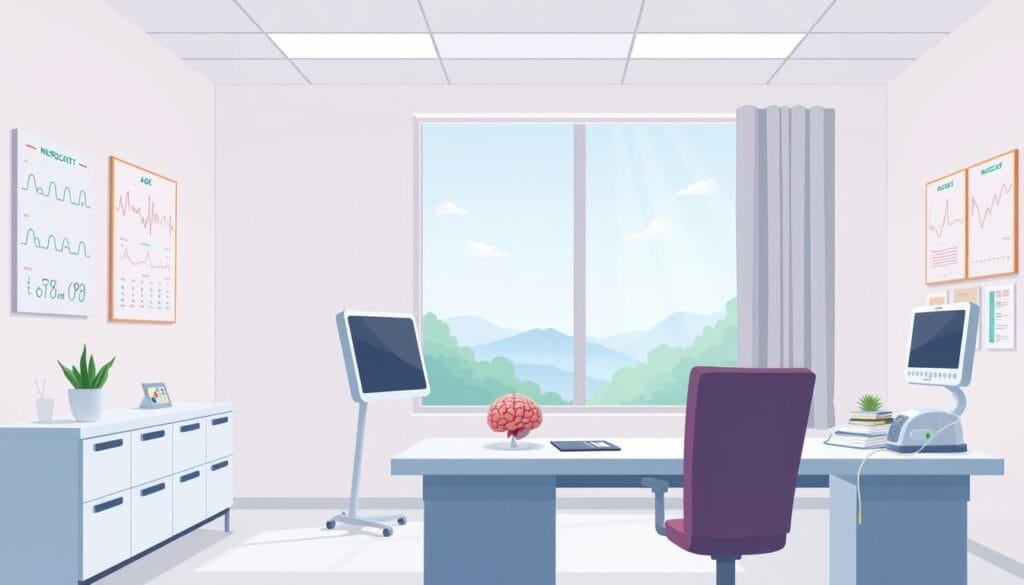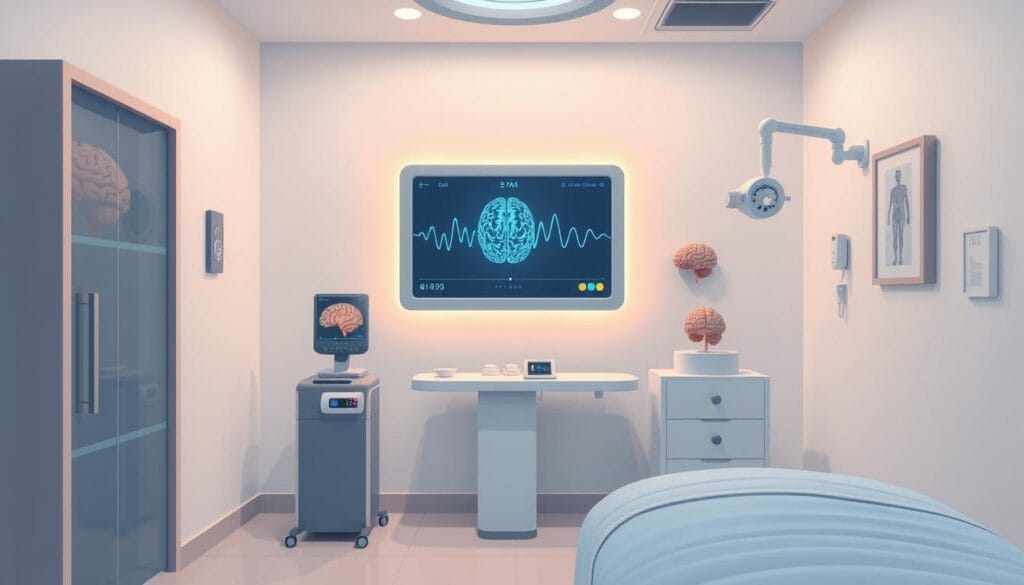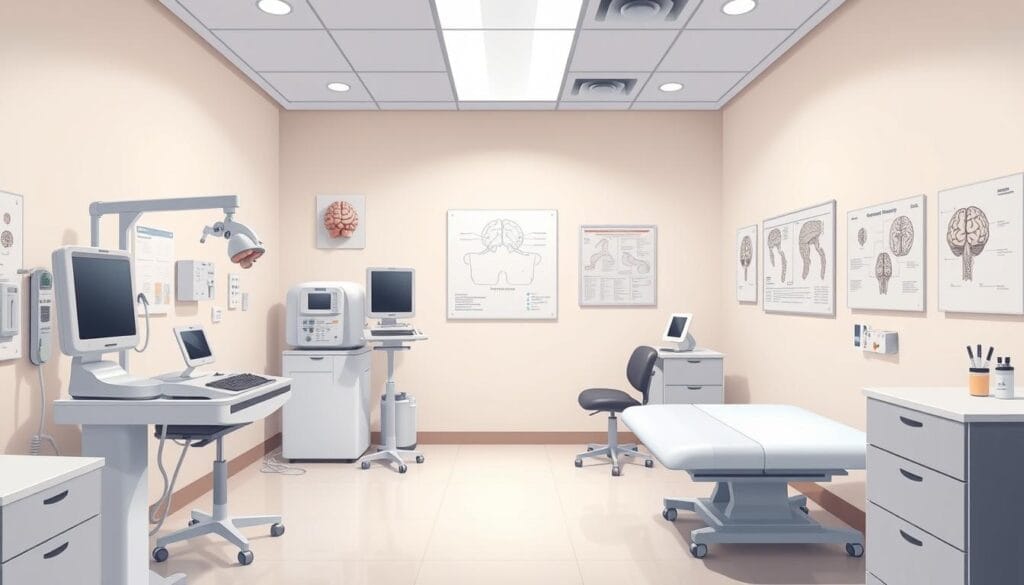Keeping the nervous system healthy is key for overall wellness. Regular checkups are vital for monitoring brain health and catching issues early. These tests, done by neurologists or medical experts, look at the brain, spinal cord, and nerves. They give important insights into your neurological health.
These checkups include a detailed look at symptoms, medical history, and physical assessments. They help doctors spot early signs of brain and nerve problems. This allows for quick action and better care for conditions.
By making regular checkups a priority, you can keep your brain and nervous system in top shape. This ensures they work well and helps catch problems early. Taking care of your neurological health improves your life and supports long-term well-being.
Table of Contents
ToggleUnderstanding Neurological Health
Neurology is a medical field that deals with the nervous system. This includes the brain, spinal cord, and nerves. Doctors use tests to check how well these parts work and find problems.
What Is Neurology?
The nervous system controls many important things. It handles movement, feeling, thinking, and behavior. Neurologists are experts who help with issues like headaches, sleep problems, and memory loss. They also deal with serious diseases like multiple sclerosis and Alzheimer’s.
Common Neurological Disorders
Here are some common neurological problems:
- Headaches (e.g., migraines, tension-type headaches)
- Sleep disorders (e.g., insomnia, sleep apnea)
- Memory loss and cognitive impairment
- Stroke and cerebrovascular diseases
- Neurodegenerative diseases (e.g., Parkinson’s, Alzheimer’s, Huntington’s)
- Epilepsy and seizure disorders
- Traumatic brain injuries
- Multiple sclerosis and other autoimmune disorders
Doctors check many things during a neurological exam. They look at mental status, nerve function, and how well you move. They also check balance, reflexes, and how you sense things. This helps them figure out what’s wrong and how to fix it.

Why Regular Checkups Matter
Good neurological health is key to feeling well. Regular checkups help a lot. They catch problems early and help fix them before they get worse.
Early Detection of Issues
Regular checkups find problems early. This includes things like brain tumors and Alzheimer’s. Finding these early means better treatment and less worry for everyone.
Monitoring Existing Conditions
- People with conditions like epilepsy need regular checkups. It helps see how the disease is changing and adjust treatments.
- These visits help notice any changes in symptoms. They guide changes in medication and help manage the condition better.
- By being careful and working with doctors, people can live better with their conditions.
Regular checkups are a smart choice for health. They help manage conditions early and improve life quality.
Recommended Age for Checkups
Keeping your brain healthy is important at every age. From babies to seniors, regular Neurological Health Checkups help spot problems early. They make sure your brain works well. Let’s look at when you should get these important tests.
Children and Neurological Health
Young kids get checked with head size and reflex tests. These tests show if a child’s brain is growing right. Kids should get Neurological Health Checkups and Brain Function Tests at certain times, like:
- 12 months
- 15 months
- 18 months
- 2 years
- 3 years
- 4 years
Adults: When to Start
Adults should also get regular Neurological Health Checkups and Cognitive Assessments. But, if you have a family history of brain problems or notice odd symptoms, start sooner. The best time to start these tests is:
- Early adulthood (18-40 years old)
- Middle adulthood (41-64 years old)
- Late adulthood (65 years and older)
Being proactive with Neurological Health Checkups helps keep your brain in top shape. It’s a smart way to stay healthy for years to come.

Signs You Need a Checkup
Keeping your brain healthy is key to feeling good. Regular checkups are a must. But, some signs mean you should see a neurologist sooner. These signs include headaches and changes in how you think.
Symptoms to Watch For
Here are some symptoms that might mean you need to see a neurologist:
- Persistent or severe headaches
- Changes in vision, balance, or coordination
- Numbness, tingling, or weakness in the limbs
- Unexplained tremors or seizures
- Memory lapses or changes in cognitive function
- Unexplained pain or sensations
Lifestyle Factors to Consider
Some lifestyle choices might mean you need more checkups. These include:
- Doing activities that could hurt your head
- Being around toxins that harm your brain
- Having health issues like diabetes or high blood pressure
- Having family members with brain problems
Being proactive and getting neurological evaluations early can help. This way, you can catch and fix problems before they get worse. Early action is crucial for your brain’s health.

What to Expect During a Checkup
A thorough neurological checkup is key for brain and nervous system health. It covers Attention Deficit Diagnosis, Dementia Screenings, and Neurological Disorder Evaluations. These tests help spot and manage many neurological problems early on.
Initial Consultation Process
The checkup starts with talking about your health history and symptoms. A neurologist or a trained healthcare worker will ask about your nervous system issues. They’ll also ask about any changes in how you think or feel.
Diagnostic Tests Overview
The physical exam then checks how well your nervous system works. It looks at:
- Mental status and thinking skills
- Cranial nerve function (like eye and tongue movements)
- Motor skills and balance
- Reflexes and how you feel things
- How your body’s automatic systems work (like blood pressure)
Based on what they find, they might do more tests. These could be blood work, genetic tests, or scans like MRI or CT. These help see the brain’s structure and activity, spotting any problems.

The detailed nature of the checkup makes sure any issues are found and handled. This leads to better care and management of your neurological health.
Benefits of Neurological Health Checkups
Regular neurological health checkups have many benefits. They help find problems early and manage current ones better. These checks are key to keeping your brain healthy and improving your life.
Improved Quality of Life
Neurological checkups can spot small brain changes early. This means you can get help before things get worse. It helps keep your brain and body working well.
Better Management of Conditions
People with brain or nerve issues get better care with regular checks. Doctors can adjust treatments and keep an eye on how the disease is growing. This makes life better for those dealing with these issues.
By focusing on brain health, you can catch and manage problems early. This is a smart way to take care of your brain and overall health.
Choosing the Right Specialist
Choosing the right specialist for your neurological health is key. Neurologists are doctors who deal with the nervous system. This includes the brain, spinal cord, and nerves. It’s important to find a neurologist who fits your specific needs.
Types of Neurologists
Neurologists specialize in different areas. For example:
- Movement disorders (e.g., Parkinson’s disease, Huntington’s disease)
- Epilepsy and seizure disorders
- Stroke and vascular neurology
- Neuromuscular disorders (e.g., myasthenia gravis, amyotrophic lateral sclerosis)
- Pediatric neurology
- Headaches and migraines
- Neuropsychological Evaluations and Neurocognitive Screenings, including Memory Tests
Factors to Consider
When picking a neurologist, think about these things:
- Credentials and Experience: Choose a board-certified neurologist with lots of experience. This means they know how to help you best.
- Communication Style: Find a neurologist who talks clearly and listens well. They should explain things in a way you can understand.
- Availability and Accessibility: Think about where their office is, how easy it is to get an appointment, and if they take your insurance. This affects how easy and affordable your care will be.
Talking to your primary care doctor can help you find the right neurologist. They might have good suggestions based on their own experiences or who they know.
Preparing for Your Appointment
Scheduling a neurological checkup is key to keeping you healthy. To get the most from your visit, prepare well. Start by making a list of your symptoms. Include when they started and how they affect your day-to-day life.
Questions to Ask Your Doctor
At your appointment, ask your neurologist about your symptoms and possible treatments. Some important questions to ask include:
- What could be causing my symptoms?
- What tests will you do to find the cause?
- What treatments are available for my condition?
- How will these treatments change my daily life?
- Are there any lifestyle changes I should make?
List of Medical History
Also, bring a detailed medical history. Include any past neurological problems, other health issues, medications, and family history of brain disorders. This info helps your neurologist make a correct diagnosis and plan a good treatment.
Having a family member or friend with you can help remember important details.
Preparing for your neurological appointment makes your visit more useful. With the right info and teamwork, you and your neurologist can keep your brain healthy. They can help with any Attention Deficit Diagnosis, Dementia Screenings, or Neurological Disorder Evaluations you face.
How to Maintain Good Neurological Health
Keeping your neurological health in check is key to a sharp mind and good health. By living a healthy lifestyle and getting regular check-ups, you can help your brain stay strong.
Lifestyle Tips
Eating foods that are good for your brain, like leafy greens and nuts, is important. Exercise regularly to boost your mood and brain health. Doing activities that challenge your mind, like learning new things, keeps your brain active.
Importance of Follow-Up Appointments
Seeing a neurologist regularly is crucial. It helps keep track of your health and makes sure treatments work. Always follow your doctor’s advice and talk openly about any changes in your health.
FAQ
What are neurological health checkups?
Neurological health checkups check the brain, spinal cord, and nerves. Doctors or nurse practitioners do these tests.
What is the purpose of regular neurological checkups?
These checkups find problems early. This means you can get treatment fast. They check many things like how you move and feel.
What are some common neurological disorders?
Common problems include headaches and memory loss. More serious issues are multiple sclerosis and Alzheimer’s disease.
When should individuals start getting neurological checkups?
Everyone needs them, from babies to adults. Babies get checked for reflexes. Adults should get them as part of their check-ups.
What symptoms might indicate the need for a neurological checkup?
Look out for headaches and vision changes. Also, numbness, weakness, and seizures are signs. So are changes in how you think or act.
What can I expect during a neurological checkup?
First, you talk about your health and symptoms. Then, a doctor checks your brain and body functions. They might do tests like blood work or imaging.
How can regular neurological checkups benefit my health?
They help find problems early. This means better treatment and a better life. Early action keeps you thinking and moving well.
What factors should I consider when choosing a neurologist?
Look at their experience and if they fit your needs. Check if they’re near you and if they take your insurance.
How can I prepare for a neurological appointment?
Write down your symptoms and medical history. Ask your doctor about your condition and treatment options.
What can I do to maintain good neurological health?
Eat well, exercise, and sleep enough. Manage stress and keep your mind active. Also, see your neurologist regularly.
About The Author

Medically reviewed by Dr. Chandril Chugh, MD, DM (Neurology)
Dr. Chandril Chugh is a U.S.-trained, board-certified neurologist with expertise in diagnosing and managing neurological disorders, including migraines, epilepsy, Parkinson’s disease, and movement disorders. His clinical focus includes evidence-based neurological care and patient education.
All content is reviewed for medical accuracy and aligned with current neurological guidelines.




